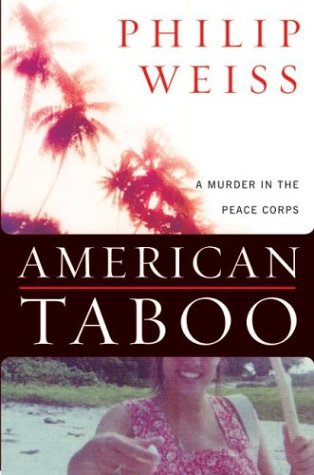June 20, 2004: Headlines: COS - Tonga: Crime: Murder: Safety and Security of Volunteers: Star Tribune: Book review: Stabbed by more than a killer's knife
Peace Corps Online:
Directory:
Tonga:
Special Report: 'American Taboo: A Murder in the Peace Corps':
June 20, 2004: Headlines: COS - Tonga: Crime: Murder: Safety and Security of Volunteers: Star Tribune: Book review: Stabbed by more than a killer's knife
American Taboo: A Murder in the Peace Corps
 | Charges possible in 1976 PCV slaying
Congressman Norm Dicks has asked the U.S. attorney in Seattle to consider pursuing charges against Dennis Priven, the man accused of killing Peace Corps Volunteer Deborah Gardner on the South Pacific island of Tonga 28 years ago. Background on this story here and here. |
 | American Taboo
Read the story of Volunteer Deborah Gardner's murder in Tonga in 1976 and how her killer has been free for the past 28 years with the help of the Peace Corps. Read an excerpt from Philip Weiss' book documenting the murder and coverup. Then read an essay by RPCV Bob Shaconis who says that Peace Corps' treatment as a "sacred cow" has exempted it from public scrutiny and that the agency has labored to preserve its shining reputation, sometimes at the expense of the very principles it is supposed to embody. |
Book review: Stabbed by more than a killer's knife

Book review: Stabbed by more than a killer's knife
Book review: Stabbed by more than a killer's knife
Reviewed By Emily Carter, Special to the Star Tribune
June 20, 2004 TABO0620
Why is it that some true crime stories compel while others only distract? There's no one answer, but it's likely that if the writer is haunted by the tale and its characters, the reader will be, too. How else to explain the riveting success of "American Taboo: A Murder in the Peace Corps," journalist Philip Weiss' first full-length book? While at times it suffers from an investigative reporter's lack of panache (it is certainly no flawless piece of prose), it also is beautiful, melancholy, at times even poetic.
The murder described here is 28 years old and took place on a remote island in the kingdom of Tonga in the South Pacific. Besides being a page turner, it is a story about youth, friendship and idealism, all lost. In other words, it is heartbreakingly relevant.
Deborah Ann Gardner was 23 when she left Steilacoom, Wash., and joined the team headed for Tonga, looking first of all for an adventure: "And if I can help some other people, why not?" She was beautiful, smart and athletic. As Weiss paints her, she also was stubborn, heedless, a bit spoiled. She wanted to be respected and to be gazed at, privacy and attention, isolation and true love. She wanted to be all grown up and independent; she loved Daddy and the fight they had before she left made her cry when she thought about it. She was, in other words, an American girl, just out of college -- a bundle of contradictions, like any human being, closely observed.
Weiss, like the many young men in her orbit, seems to have fallen a little in love with her, which, in his case, only adds to the closeness of observation. He declares that though she liked to have a good time and surrounded herself with friends, she was essentially a loner and kept the closest part of herself blocked off.
This aloofness might have cost her justice in the end. She was found dying, not dead, and she named her murderer before bleeding to death: "Dennis." That alone should have been enough, but there were eyewitnesses and more than enough physical evidence to convict Dennis Priven, whom Weiss describes as a self-pitying, narcissistic creature -- at once brilliant and pathetic -- and, ultimately, evil.
But the Peace Corps, and Priven's young, idealistic friends, banded together to give Priven an insanity defense. Due to an unscrupulous manipulation of international law, he walked away a free man. In Weiss' portrait, he is exactly as crazy as a fox. It's a jaw-dropping miscarriage of justice, but "American Taboo" is more than a tale of the legal system perverted.
First of all, there is Tonga -- an island that the young volunteers find either maddening or irresistible (sometimes both). Weiss, using donated journals, letters and exhaustive interviews, renders the place and time unforgettable. The Tongan people appear to be the only heroes in this book -- bushwhacked by the Peace Corps' manipulation and the U.S. State Department's legal trickery.
It is left to the head of the Tongan police to proclaim, "I feel all the sympathy is for Dennis and none for the victim and her family." That the government ambushed the trial for its own purposes is sad but not shocking. What Weiss describes as the total desertion of Debbie's friends, however, is unbelievably appalling. With a few exceptions, all of them stuck by her malingering and cowardly murderer. Why? Weiss doesn't push for answers so much as let them float to the surface, like dead fish.
In hindsight, people's reasons were weak-minded, wrong-headed and completely, understandably human.
Likewise flawed, but far more tragic, Deb's stubborn, heartbroken father is unforgettable. Weiss makes Wayne Gardner into a modern-day Lear -- a man whose silent feud with his daughter was born of a spat that would have resolved itself in months if given the chance. It wasn't, and his regret and self-recrimination are indelibly marked in the readers mind:
"Mistake number one million. No. One million and five," he rails at himself -- alone in Alaska. If Weiss is to be credited with even a modicum of ethics, these words and feelings had to have come from Gardner himself, which means Weiss got the father to allow him not just into his mind but also into his heart. The story of this murder, this place, this time, likewise gets into ours.
Emily Carter, of Minneapolis, is the author of the short story collection "Glory Goes and Gets Some."

Some postings on Peace Corps Online are provided to the individual members of this group without permission of the copyright owner for the non-profit purposes of criticism, comment, education, scholarship, and research under the "Fair Use" provisions of U.S. Government copyright laws and they may not be distributed further without permission of the copyright owner. Peace Corps Online does not vouch for the accuracy of the content of the postings, which is the sole responsibility of the copyright holder.
Story Source: Star Tribune
This story has been posted in the following forums: : Headlines; COS - Tonga; Crime; Murder; Safety and Security of Volunteers
PCOL12103
13
.



